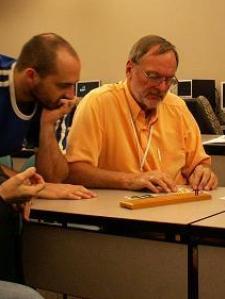Farrooh F. answered • 01/13/17
Physics & Math Expert — AP, SAT, Olympiads, Advanced Courses
|A| = SQRT(A A*)
where A is the original number, whereas A* its complex conjugate. For example, if A = Re + i Im, then A* = Re - i Im.
Next, consider a real number R. Raise it to the power of i. That is:
A = Ri
The complex conjugate of this number would be:
A* = R-i
Now the absolute value of this would be:
|A| = SQRT(A A*) = SQRT(Ri R-i) = SQRT(R0) = SQRT(1) = 1.
This is because any number raised to the power of 0 is 1 by definition. I could prove that too if you want, but I dont think that is necessary, unless you want me to prove.

Farrooh F.
01/13/17







Josh S.
01/13/17